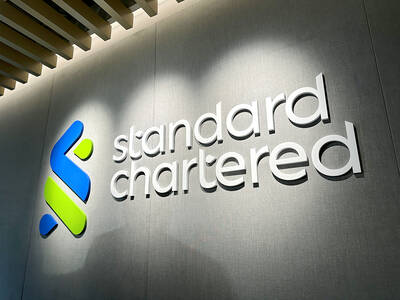The central bank on Friday met with 36 domestic lenders, asking them to comply with risk management requirements and refrain from cutthroat competition in mortgage operations.
The plea came after housing and construction lending continued to grow last quarter despite two waves of selective credit controls intended to cool the local property market.
The central bank said it has since January been inspecting mortgage operations and found that most lenders abide by risk management rules.

Photo: Tyrone Siu, Reuters
However, some lenders failed to exercise caution by offering interest rates that were below market average, it said.
“Banks must factor in funding costs, operating overhang, potential credit losses and other things when setting interest rates for real-estate property lending,” the central bank said in a statement released after the closed-door meeting.
The central bank has held several meetings over the past few months calling for self-restraint on the part of lenders, aiming to curb hikes in property prices caused by low interest rates and excessive liquidity after global central banks printed money to ease the effects of the COVID-19 pandemic.
Under-par interest rates are unfavorable for risk controls and pose a threat to the stability of the nation’s financial market, the central bank said, asking top executives at local banks to oversee internal pricing practices.
The central bank had earlier said it was displeased that local lenders’ housing and construction lending had not yet responded to credit tightening it introduced in December last year and March.
The central bank said that some officials have suggested more drastic steps to rein in the property market, while others believe more time is needed to judge the success of credit controls.
Central bank Governor Yang Chin-long (楊金龍) has told lawmakers that, if necessary, he might further tighten lending terms at the bank’s quarterly board meeting next month.

South Korea’s equity benchmark yesterday crossed a new milestone just a month after surpassing the once-unthinkable 5,000 mark as surging global memory demand powers the country’s biggest chipmakers. The KOSPI advanced as much as 2.6 percent to a record 6,123, with Samsung Electronics Co and SK Hynix Inc each gaining more than 2 percent. With the benchmark now up 45 percent this year, South Korea’s stock market capitalization has also moved past France’s, following last month’s overtaking of Germany’s. Long overlooked by foreign funds, despite being undervalued, South Korean stocks have now emerged as clear winners in the global market. The so-called “artificial intelligence

Chinese artificial intelligence (AI) start-up DeepSeek’s (深度求索) latest AI model, set to be released as soon as next week, was trained on Nvidia Corp’s most advanced AI chip, the Blackwell, a senior official of US President Donald Trump’s administration said on Monday, in what could represent a violation of US export controls. The US believes DeepSeek will remove the technical indicators that might reveal its use of American AI chips, the official said, adding that the Blackwells are likely clustered at its data center in Inner Mongolia, an autonomous region of China. The person declined to say how the US government received

FORTUNES REVERSED: The new 15 percent levies left countries with a 10 percent tariff worse off and stripped away the advantage of those with a 15 percent rate In a swift reversal of fortunes, countries that had been hardest hit by US President Donald Trump’s tariffs have emerged as the biggest winners from the US Supreme Court’s decision to strike down his emergency levies. China, India and Brazil are among those now seeing lower tariff rates for shipments to the US after the court ruled Trump’s use of the International Emergency Economic Powers Act to impose duties was illegal. While Trump subsequently announced plans for a 15 percent global rate, Bloomberg Economics said that would mean an average effective tariff rate of about 12 percent — the lowest since

Standard Chartered Bank Taiwan’s newly appointed chief executive officer, Anthony Yu (游天立), yesterday unveiled an ambitious growth strategy for the bank’s wealth management division, reflecting a bullish outlook on Taiwan’s high-net-worth market. Yu, the first local executive to lead Standard Chartered Bank’s Taiwan operations, emphasized rising client demand and detailed plans to expand the bank’s digital capabilities, as well as its physical presence across the country. Standard Chartered Taiwan saw a remarkable surge in new wealth management clients last month, with the number of clients holding assets equivalent to US$1 million more than doubling compared with the same month last year, he